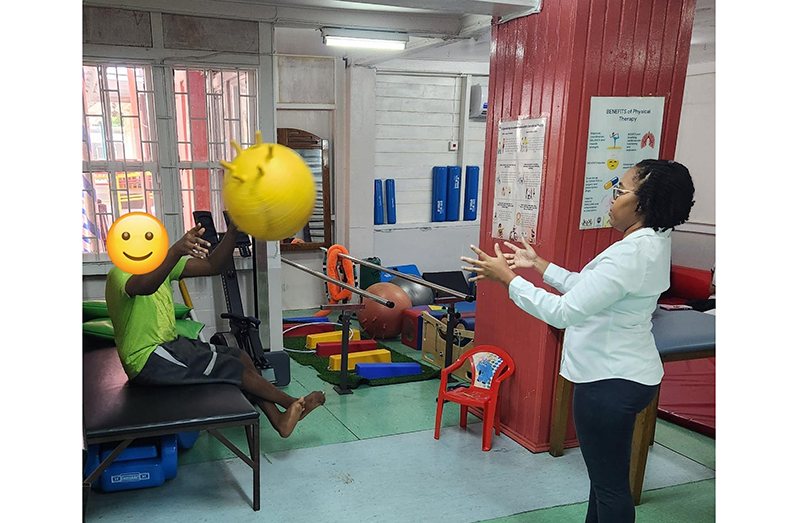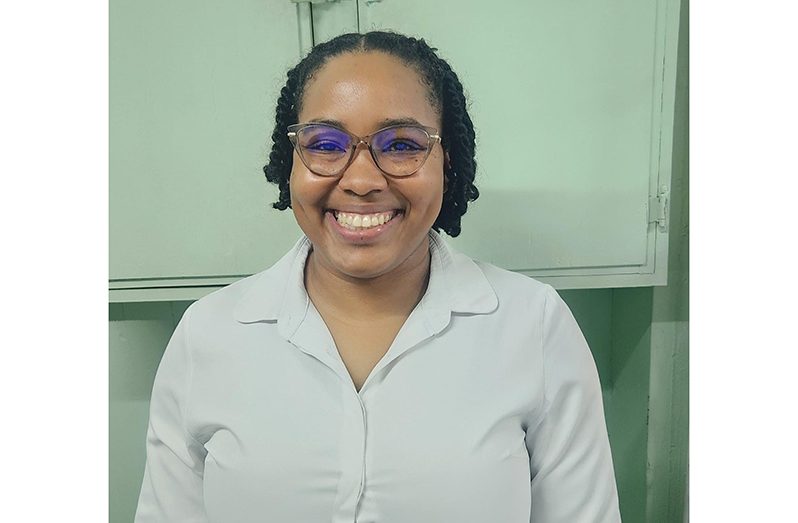GROWING up, Jemima Crosse always had her eyes set on becoming a physiotherapist because she wanted to help people. To achieve that, she knew she had to work hard without being distracted, and that was what she had set out to do.
Crosse qualified herself, securing a job as a physiotherapist attached to the Ministry of Health Ptolemy Reid Rehabilitation Centre. She works with children and persons with disabilities.
She is a city girl who has been a physiotherapist for the past six years. She applied for the position after graduating from the University of Guyana (UG) in 2108 with a degree in medical rehabilitation and a major in physiotherapy.
Crosse told the Pepperpot Magazine that she always wanted to help people heal on a long-term basis rather than seeing patients for just one time like a doctor, so she opted to become a physiotherapist. She stated that she had always been interested in medical intervention growing up and decided to pursue a career in that field after realising it would be a job she would like.
Equipped with the necessary skills, Crosse believed that hands-on practical therapy suited her friendly demeanour. She feels that her role is essential to treat and manage children and others with disabilities, thus helping them regain their independence and fully use their mobility.
Crosse reported that the Ptolemy Reid Rehabilitation Centre offers a wide variety of therapy to restore people with disabilities to their former state of full restoration.
She added that she deals with various aspects of physical therapy, whether it’s permanent or temporarily dealing with mobility, speech and language.
“I am friendly. I try to get to know my patients. The children would be accompanied by their parents, and of course, they have a lot of questions, so it is best to address those before forming bonds,” she said.

Crosse related that it is often wise to put the patient and his/her parents at ease by giving them a detailed report of their child’s condition and what is needed to make them better, to guide them since it is not going to be a quick fix. It is more long-term.
She pointed out that therapy takes on a holistic approach, and they look at all the needs of the patients, including social and educational, to link to other professionals to give them the care/treatment they need.
Crosse disclosed that therapy is also a transfer of services and not just clinical; it requires patience to restore the patient to full mobility. She stated that therapy entails having the right attitude to meet and greet patients and their accompanying parent/guardian and also be able to work along with them for best practices and the way forward. The physiotherapist told the Pepperpot Magazine that physiotherapy is the healthcare profession that focuses on maximising an individual’s full potential to improve their quality of life through various therapeutic interventions.
“As a physiotherapist, I currently work with children with physical disabilities and amputee patients at the Ptolemy Reid Rehabilitation Centre. As a physiotherapist, I promote holistic care where rehabilitation is not just for the clinic but for outside of the clinic in the individual’s school, home environment, recreational environment and much more. This is to ensure that the individual is able to participate fully in all areas to the best of their ability,” she said.
Crosse pointed out that working with children is a joy and something she envisioned from a young age. Seeing them achieve milestones that were delayed is rewarding. She noted that working with children involves much structural play and adapting to the environment and the child because children get bored easily, so one will always have to be innovative. Crosse pointed out that early professional intervention is key for children to be restored to full capacity in their mobility.
“If you see something wrong, seek help through the medical field. Pregnant mothers need to be screened thoroughly during their pregnancy because daily therapy is key for us to achieve our goals (parents and child) as well as our goals. You must be consistent. Support networks are important to ensure you surround yourself with a good support system and remember that the clinic also offers that support to parents through our support groups. Our social worker is always available to speak to you about your concerns and even the therapists,” Crosse reasoned.
She related that watching a child with no head mobility from infancy to toddler and beyond regain full control of their head mobility is an amazing therapy journey and entails hard work with both patient and parent.
Crosse shared that she is currently pursuing an online 18-month programme at the University of the West Indies, after which she will attain her Masters in physiotherapy, which will better equip her to function in her role at maximum capacity.



.jpg)








